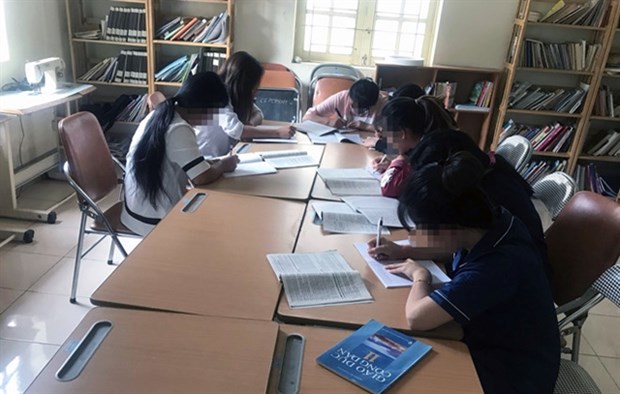Reintegration shelter for human trafficking victims in Lao Cai
 Trafficked victims attend a class at the Compassion House. (Photo: thanhnien.vn )
Trafficked victims attend a class at the Compassion House. (Photo: thanhnien.vn )
Lao
Cai (VNS/VNA) - Nguyen Thi
Van (not her real name) from the northern mountainous province of Lao Cai was
lured across the border to China and sold off as a wife when she was 16 years
old.
Three months later, she escaped from her husband and returned to Vietnam, but it was not easy for her back in her hometown where villagers criticised her for going in the first place.
She decided to leave her village and move to a reintegration shelter which was also a home for human trafficking survivors in Lao Cai.
Lao Cai province, located on the border with China, is a hot spot for human trafficking.
Between 2015 and October 2019, the province welcomed home 436 trafficking victims from China.
Most of the victims are forced to work as prostitutes for no money, while others are sent to labour in the farms or forests unpaid. Others go to work in China legally then change jobs with the promise of higher salaries, but end up trapped by the traffickers, according to local authorities.
Their refuge, the Compassion House, is supported by the Pacific Links Foundation, and offers reintegration services, vocational training, academic schooling, literacy and reproductive health awareness for female human trafficking victims.
It's not just about accommodation; the home is a place where human trafficking survivors who risk their lives to regain their freedom receive emotional support from psychological consultants so they can find jobs and legal assistance and regain their self-confidence.
Van, now 23, is working as a cook at a restaurant in Sa Pa after finishing college and marrying a man who sympathises with her past.
The house has helped hundreds of women overcome the trauma of their ordeals so they can find work and reintegrate into society.
Nguyen Tuong Long, head of the Compassion House’s management board, said: “Most victims suffer from severe psychological trauma. Many want to commit suicide, feel inferior and stay away from other people. It takes a lot of effort to help them reintegrate.”
Long, also the founder of the Compassion House, said many victims preferred to remain isolated, which put them at further risk of being trafficked again.
In 2007, when he was head of the provincial Department of Social Evil Prevention, he opened the Compassion House.
Since then, more than 220 victims have received assistance, some of them as young as 10 years old.
At the house, the victims receive physical and psychological assistance first, then get access to reintegration services and can choose whether staying at the house or return home.
If their living environment is not safe enough, the consultants advise them to stay at the house. None of them are allowed to use mobile phones and they are advised to ignore strangers.
Luong Hong Loan, deputy director of the Pacific Links Foundation, said strict regulations at the house are necessary to protect the victims. "We always put victims at the core of all our activities," she said./.













